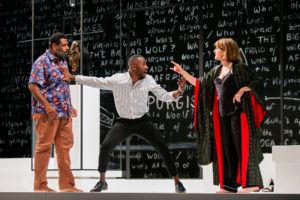Drama Theatre, January 14
7/10
“It gets pretty bouncy around here sometimes,” George tells Nick early in Act Two. “Bouncy” epitomises George’s love of understatement, a weapon in his eternal war with his predatory wife, Martha. Part of the timeless genius of Edward Albee’s 1962 play lies in its being set up as if only Martha can possibly win, but George, like many an animal, turns out to be most dangerous when wounded.

George and Martha both have big, bad wolves in their lives from which they hide, using an elaborate camouflage of alcohol-fuelled delusion. Their marriage is a viper’s nest, but it’s not a sham, and one of director Margaret Harvey’s best decisions (in this State Theatre Company South Australia production) is to show a flicker of affection between them at the outset.
It’s echoed when Martha tells Nick, in the wake of their apparently flavourless coital encounter, that George is the only man who has ever made her happy. Nick is dismissive, but that’s precisely why the sex was unsatisfactory: he doesn’t understand how interchangeable are Martha’s life and game-playing – and George plays a mean hand in a game.

This production, running for three-and-a-quarter hours (and even if a zillion times better than Belvoir’s 2007 abomination), labours under impositions. A director talking about “breathing new life” into Albee’s masterpiece in the program note is disturbing: it needs “new life” about as much as Monet’s Water Lilies needs a coat of Taubmans.
The play quite happily withstands Harvey’s relocating it from New England to Australia. She then employs what she terms “colour-conscious casting”, whereby Martha (Susan Prior) is white, George (Jimi Barni) and Nick (Rashidi Edward) are black and Nick’s wife Honey (Juanita Navas-Nguyen) is Asian. This certainly makes particular lines leap from the text, as when George and Martha toy with whether Nick should be termed a houseboy or a stud following the latest of what Martha calls her “crummy, totally pointless infidelities”. But ultimately Albee’s people have such monstrous fish to fry that skin-colour seems a mere side-salad compared with characterisation.

Prior is mostly magnificent: her Martha a great barnacle on the arse of her daddy’s boutique university, where George’s career as a history professor is becalmed, and where Nick is a biology hotshot just taking off. Prior makes Martha terrifying, yet also reveals the soft underbelly of disappointment beneath the braying vulgarity and reflexive viciousness towards George. Barni’s George comes within an ace of fully being the worthy foil she craves, giving George warmth and humour to go with the brutal sarcasm and ineffable pain. Edward, too, catches most of Nick’s uppity smugness, and is sensational at seducing Martha, while remaining naive about being merely the lure rather than the catch of the day.
But this four-hander was penned with the finesse of a Beethoven string
quartet, and, alas, Navas-Nguyen’s Honey is simply out of tune with the others. It’s a glorious role with its parade of dumb gaffs, girlish dread and sudden insights, but Navas-Nguyen plays it all on one level, with no ear for the cadences.
This drags down an otherwise satisfying production, played out on an elaborate set by Ailsa Paterson, surrounded by a giant blackboard bearing countless iterations of the title and Albee’s subtitles for the three acts. Like a warzone, the set is reduced to nothing by the finale, the characters grovelling on the floor when George delivers his coup de grace.